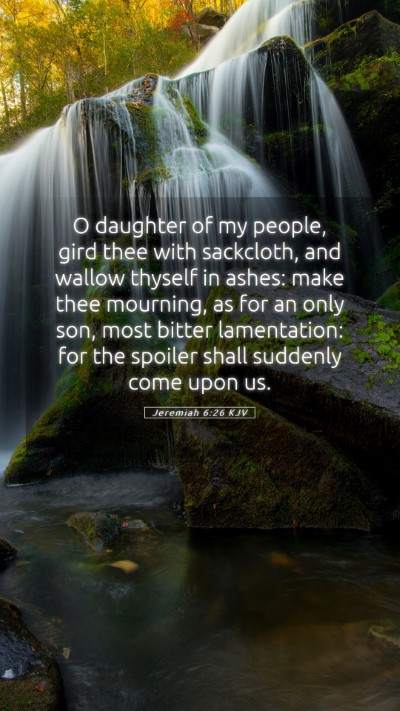Bible Verse Commentary: Jeremiah 6:26
In Jeremiah 6:26, the prophet calls upon the people to act with profound seriousness regarding their impending doom. This verse serves as a poignant reminder of the consequences of sin and the need for repentance. The imagery used conveys a sense of urgency and deep emotional engagement, reflecting the desperate condition of the people of Judah.
Meaning and Insights from Public Domain Commentaries
This section combines insights from prominent biblical commentators including Matthew Henry, Albert Barnes, and Adam Clarke to provide a comprehensive understanding of Jeremiah 6:26.
Matthew Henry's Commentary
Matthew Henry emphasizes the metaphor in this verse, likening the audience to a mourning people, called to wrap themselves in sackcloth, which symbolizes grief and penitence. He notes that this call to lamentation signifies the gravity of their transgressions and the ominous fate awaiting them if they do not repent. Henry points out that the prophet’s use of the term "daughter of my people" illustrates a deep emotional connection, akin to that of a parent lamenting a wayward child.
Albert Barnes’ Commentary
Albert Barnes explicates this verse by highlighting the communal aspect of mourning in ancient Israel. His interpretation stresses that the ‘daughter of my people’ signifies the entire nation rather than individuals. He reinforces the idea that there was a collective guilt and that the reaction should be one of heartfelt mourning, reinforcing the need for sincere repentance. Barnes urges readers to consider the historical context of the impending Babylonian invasion, representing God’s judgment upon a disobedient nation.
Adam Clarke’s Commentary
Adam Clarke emphasizes the language of this verse, particularly the reference to “sackcloth” as indicative of mourning attitudes required in the face of impending calamity. He aligns this call to dress in sackcloth with God’s desire for purity and transformation within His people. Clarke also expands on the significance of lamentation as a means of recognizing the severity of their spiritual condition and the necessity for turning back to God.
Implications for Personal and Communal Faith
The call to mourn and repent in Jeremiah 6:26 has significant implications for both personal and communal faith. It serves as a historical reminder of the consequences of turning away from God and the ever-present invitation to return to Him in humility and sincerity.
Applying the Verse to Daily Life
Contemporary readers can glean much from this verse when considering how to interpret Bible verses in their lives today. This verse invites introspection and a serious evaluation of one’s life in light of God’s standards. The emotional weight behind the call to “mourn like one for an only son” encourages believers to acknowledge their vulnerabilities and the grace available through thoughtful repentance.
Cross References
- Lamentations 1:12: Echoes the mourning and the lamentation over the fallen state of Jerusalem.
- Isaiah 22:12: Discusses a similar call to weeping and mourning due to impending judgment.
- Ezekiel 18:30: Calls the people to repentance and to turn from all their offenses.
Conclusion
Jeremiah 6:26 serves as a powerful reminder of God’s desire for His people to recognize the significance of sin, prompting genuine mourning and repentance. Through the insights drawn from esteemed commentaries, believers are encouraged to embrace the gravity of this call while recognizing the hope available in turning back to God. Each reader has the opportunity to engage in personal and communal reflection, ensuring that the lessons from scripture are understood, embodied, and applied in daily life.
The enduring relevance of this passage teaches us how to approach difficult Bible passages with a heart inclined toward understanding and genuine transformation, underscoring the importance of maintaining an active dialogue with God and one another in the context of faith.


